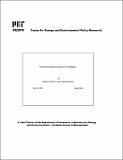| dc.contributor.author | Liski, Matti | en_US |
| dc.contributor.author | Montero, Juan-Pablo | en_US |
| dc.contributor.other | Massachusetts Institute of Technology. Center for Energy and Environmental Policy Research. | en_US |
| dc.date.accessioned | 2009-04-03T17:06:10Z | |
| dc.date.available | 2009-04-03T17:06:10Z | |
| dc.date.issued | 2004 | en_US |
| dc.identifier | 2004-012 | en_US |
| dc.identifier.uri | http://hdl.handle.net/1721.1/45020 | |
| dc.description.abstract | We consider an infinitely-repeated oligopoly in which at each period firms not only serve the spot market by either competing in prices or quantities but also have the opportunity to trade forward contracts. Contrary to the pro-competitive results of finite-horizon models, we find that the possibility of forward trading allows firms to sustain collusive profits that otherwise would not be possible. The result holds both for price and quantity competition and follows because (collusive) contracting of future sales is more effective in deterring deviations from the collusive plan than in inducing the previously identified pro-competitive effects. | en_US |
| dc.format.extent | 16 p | en_US |
| dc.publisher | MIT Center for Energy and Environmental Policy Research | en_US |
| dc.relation.ispartofseries | MIT-CEEPR (Series) ; 04-012WP. | en_US |
| dc.title | Forward trading and collusion in oligopoly | en_US |
| dc.type | Working Paper | en_US |
| dc.identifier.oclc | 56572295 | en_US |
